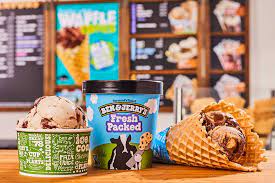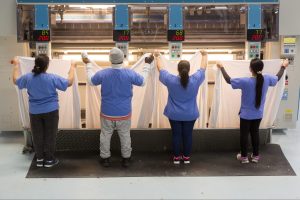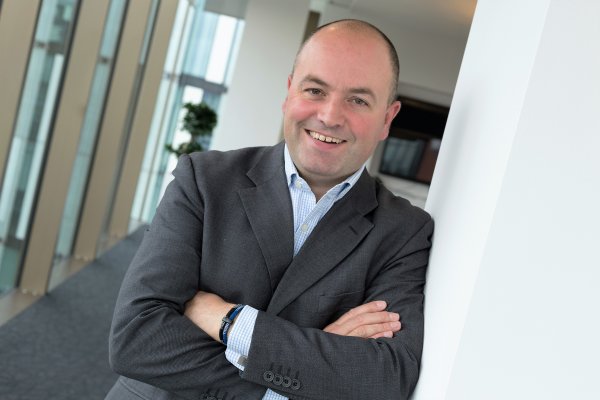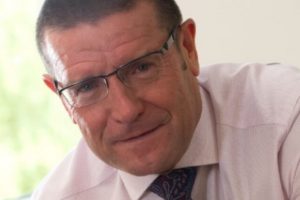Unilever to separate ice cream business and cut 7,500 office-based roles globally

Consumer goods giant, Unilever, is to separate its ice cream business, which includes brands like Ben and Jerry’s, and introduce a new productivity plan, under new CEO, Hein Schumacher, who took over last summer.
The productivity plan could result in around 7,500 redundancies in office-based roles globally, the group said.
The announcement has gone down well with investors with Unilever shares trading 5.3% up on the opening price early this morning.
The group, which operates a key home and personal care manufacturing site and research and development facility at Port Sunlight, Wirral, said it is stepping up its Growth Action Plan (GAP) with the latest moves by Mr Schumacher.
The board said it believes that Unilever should be increasingly focused on a portfolio of unmissably superior brands with strong positions in highly attractive categories that have complementary operating models.
This is where the company can most effectively apply its innovation, marketing and go-to-market capabilities. Ice cream has a very different operating model, and as a result the board has decided that the separation of ice cream best serves the future growth of both ice cream and Unilever.
Following separation of ice cream, Unilever will become a simpler, more focused company, operating four business groups across Beauty & Wellbeing, Personal Care, Home Care and Nutrition.
The separation of ice cream will assist Unilever’s management to accelerate the implementation of its GAP, announced in October 2023, which is focused on doing fewer things, better, with greater impact to drive consistent and stronger topline growth, enhance productivity and simplicity, and step up Unilever’s performance culture.
The Unilever board said it is confident that the future growth potential of ice cream will be better delivered under a different ownership structure. Ice cream has distinct characteristics compared with Unilever’s other operating businesses. These include a supply chain and point of sale that support frozen goods, a different channel landscape, more seasonality, and greater capital intensity.
The separation will create a world leading business, operating in a highly attractive category, with brands that together delivered turnover of €7.9bn in 2023. The business has five of the top 10 selling global ice cream brands including Wall’s, Magnum and Ben & Jerry’s, with exposure in both the in-home and out-of-home segments across a global footprint.
Under new leadership, ice cream is already making significant operational changes at pace that are expected to drive stronger performance. These include improved productivity and efficiencies, product rationalisation, and investment behind significant innovations.
As a standalone, more focused business, ice cream’s management team will have operational and financial flexibility to grow its business, allocate capital and resources in support of the company’s distinct strategy, including further optimising its manufacturing and logistics network, and developing wide reaching, flexible, distribution channels over and above the changes that are currently under way in the business.
A demerger of ice cream is the most likely separation route, and in that case Unilever expects the company to operate with a capital structure in line with comparable listed companies. Other options for separation will be considered to maximise returns for shareholders. The costs and operational dis-synergies relating to the separation of ice cream will be determined by the precise transaction structure chosen.
Separation activity will begin immediately, with full separation expected by the end of 2025.
Building on the early momentum of GAP the group has identified additional efficiencies that can now be accelerated. In addition to the portfolio changes, Unilever intends to launch a comprehensive productivity programme, driving focus and faster growth through a leaner and more accountable organisation, enabled by investment in technology.
The productivity programme is expected to deliver total cost savings of around €800m over the next three years, more than offsetting estimated operational dis-synergies from the separation of ice cream.
The proposed changes are expected to impact around 7,500 predominantly office-based roles globally, with total restructuring costs now anticipated to be around 1.2% of group turnover for the next three years – up from the around one per cent of group turnover previously communicated. These proposals will be subject to consultation.
Ian Meakins, chair of Unilever, said: “The board is determined to transform Unilever into a higher growth, higher margin business that will deliver consistently for all stakeholders. Improving our performance and sharpening our portfolio are key to delivering the improved results we believe Unilever can achieve.
“The separation of ice cream and the delivery of the productivity programme will help create a simpler, more focused, and higher performing Unilever. It will also create a world leading ice cream business, with strong growth prospects and an exciting future as a standalone business.”
CEO, Hein Schumacher, said: “Under the Growth Action Plan we have committed to do fewer things, better, and with greater impact. The changes we are announcing today will help us accelerate that plan, focusing our business and our resources on global or scalable brands where we can apply our leading innovation, technology and go-to-market capabilities across complementary operating models.
“Simplifying our portfolio and driving greater productivity will allow us to further unlock the potential of this business, supporting our ambition to position Unilever as a world leading consumer goods company delivering strong, sustainable growth and enhanced profitability.”
He added: “We are committed to carrying out our productivity programme in consultation with employee representatives, and with respect and care for those of our people who are impacted.”
Russ Mould, investment director at Manchester investment platform, AJ Bell, said: “When the market was speculating about steps Unilever might take to revive its fortunes, a spin-off of its ice cream division had not been that widely discussed – even if political pronouncements from Ben & Jerry’s had provoked a meltdown among some investors.

Russ Mould
“A side benefit of the brand exiting Unilever’s portfolio is it might quieten the ‘go woke and go broke’ noise but more widely the reasoning for the decision looks pretty sound.
“It costs the company more to sustain the ice cream business, there is a different supply chain because it is dealing with frozen goods and it’s more seasonal than the company’s other roster of brands.
“A demerger and separate stock market listing for the ice cream arm is seen by Unilever as the most likely outcome with a fairly tight deadline of the end of next year set by the company. Less than a year into his tenure, CEO Hein Schumacher is certainly making his mark on the group.”
He added: “Schumacher will ultimately be judged on his ability to revive the fortunes of the remaining ‘simplified’ operation. Job cuts and efficiency savings are straight out of the corporate turnaround, playbook but that doesn’t mean they are without any merit.
“There will still need to be investment in the company’s key brands and sensible positioning to ensure the company retains its pricing power.
“Achieving underlying sales growth and margin improvement doesn’t sound an overly-ambitious goal, but given the extent of price increases consumers have had to stomach thanks to inflation, it may not be easy to achieve.
“The danger for Unilever is that people are put off its branded goods because of the cost and they turn to cheaper supermarket own-brand alternatives. This risk is particularly acute in the West where quality unbranded goods are widely available. Unilever is in a stronger position in emerging markets where the same choice is not as freely available.”








